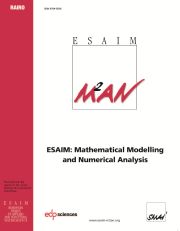Crossref Citations
This article has been cited by the following publications. This list is generated based on data provided by
Crossref.
Weckner, Olaf
Askari, Abe
Xu, Jifeng
Razi, Hamid
and
Silling, Stewart
2007.
Damage and Failure Analysis based on Peridynamics - Theory and Applications.
Blanc, Xavier
Le Bris, Claude
and
Legoll, Frédéric
2007.
Analysis of a Prototypical Multiscale Method Coupling Atomistic and Continuum Mechanics: the Convex Case.
Acta Mathematicae Applicatae Sinica, English Series,
Vol. 23,
Issue. 2,
p.
209.
Blanc, Xavier
Le Bris, Claude
and
Lions, Pierre-Louis
2007.
Atomistic to Continuum limits for computational materials science.
ESAIM: Mathematical Modelling and Numerical Analysis,
Vol. 41,
Issue. 2,
p.
391.
Lin, Ping
2007.
Convergence Analysis of a Quasi‐Continuum Approximation for a Two‐Dimensional Material Without Defects.
SIAM Journal on Numerical Analysis,
Vol. 45,
Issue. 1,
p.
313.
Miller, Ronald E.
and
Tadmor, Ellad B.
2007.
Hybrid Continuum Mechanics and Atomistic Methods for Simulating Materials Deformation and Failure.
MRS Bulletin,
Vol. 32,
Issue. 11,
p.
920.
Arndt, Marcel
and
Luskin, Mitchell
2008.
Error Estimation and Atomistic-Continuum Adaptivity for the Quasicontinuum Approximation of a Frenkel–Kontorova Model.
Multiscale Modeling & Simulation,
Vol. 7,
Issue. 1,
p.
147.
Dobson, Matthew
and
Luskin, Mitchell
2008.
Analysis of a force-based quasicontinuum approximation.
ESAIM: Mathematical Modelling and Numerical Analysis,
Vol. 42,
Issue. 1,
p.
113.
Badia, Santiago
Parks, Michael
Bochev, Pavel
Gunzburger, Max
and
Lehoucq, Richard
2008.
On Atomistic-to-Continuum Coupling by Blending.
Multiscale Modeling & Simulation,
Vol. 7,
Issue. 1,
p.
381.
Arndt, Marcel
and
Luskin, Mitchell
2008.
Goal-oriented adaptive mesh refinement for the quasicontinuum approximation of a Frenkel-Kontorova model.
Computer Methods in Applied Mechanics and Engineering,
Vol. 197,
Issue. 49-50,
p.
4298.
Braides, Andrea
and
Truskinovsky, Lev
2008.
Asymptotic expansions by Γ-convergence.
Continuum Mechanics and Thermodynamics,
Vol. 20,
Issue. 1,
p.
21.
Dobson, Matthew
and
Luskin, Mitchell
2008.
Iterative Solution of the Quasicontinuum Equilibrium Equations with Continuation.
Journal of Scientific Computing,
Vol. 37,
Issue. 1,
p.
19.
Parks, Michael L.
Bochev, Pavel B.
and
Lehoucq, Richard B.
2008.
Connecting Atomistic-to-Continuum Coupling and Domain Decomposition.
Multiscale Modeling & Simulation,
Vol. 7,
Issue. 1,
p.
362.
Etoughe, M. Betoue
and
Panasenko, G.
2008.
Partial homogenization of discrete models.
Applicable Analysis,
Vol. 87,
Issue. 12,
p.
1425.
Dobson, Matthew
and
Luskin, Mitchell
2009.
An Optimal Order Error Analysis of the One-Dimensional Quasicontinuum Approximation.
SIAM Journal on Numerical Analysis,
Vol. 47,
Issue. 4,
p.
2455.
Ming, Pingbing
and
Yang, Jerry Zhijian
2009.
Analysis of a One-Dimensional Nonlocal Quasi-Continuum Method.
Multiscale Modeling & Simulation,
Vol. 7,
Issue. 4,
p.
1838.
Dobson, Matthew
and
Luskin, Mitchell
2009.
An analysis of the effect of ghost force oscillation on quasicontinuum error.
ESAIM: Mathematical Modelling and Numerical Analysis,
Vol. 43,
Issue. 3,
p.
591.
Benguria, R.
Dolbeault, J.
and
Monneau, R.
2009.
Harnack Inequalities and Discrete—Continuous Error Estimates for a Chain of Atoms with Two—Body Interactions.
Journal of Statistical Physics,
Vol. 134,
Issue. 1,
p.
27.
Dobson, M.
Luskin, M.
and
Ortner, C.
2010.
Accuracy of quasicontinuum approximations near instabilities.
Journal of the Mechanics and Physics of Solids,
Vol. 58,
Issue. 10,
p.
1741.
Blanc, X.
Le Bris, C.
Legoll, F.
and
Patz, C.
2010.
Finite-Temperature Coarse-Graining of One-Dimensional Models: Mathematical Analysis and Computational Approaches.
Journal of Nonlinear Science,
Vol. 20,
Issue. 2,
p.
241.
Dobson, M.
Luskin, M.
and
Ortner, C.
2010.
Sharp Stability Estimates for the Force-Based Quasicontinuum Approximation of Homogeneous Tensile Deformation.
Multiscale Modeling & Simulation,
Vol. 8,
Issue. 3,
p.
782.


